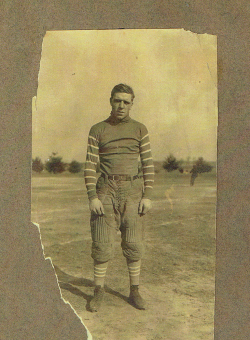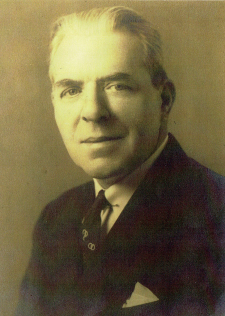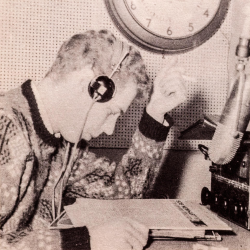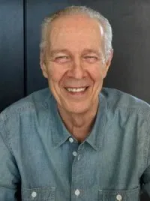.
.
(photo from the back of the publisher’s 1959 Columbia Records album, Kind of Blue by Miles Davis)

.
So What!
or,
Where were you when you first heard Kind of Blue?
.
by Bob Hecht
.
…..“Robbie, if you keep hanging out in jazz clubs over there you’re just going to get caught up with a bunch of whores, ‘n——,’ queers and dope fiends!”
…..This is my grandfather talking to me one day in 1959 in New Jersey, when I’m 18—he’s trying futilely to warn me of the dangers of the dreaded and deviant jazz life across the Hudson River in New York City.
…..That jazz life includes, in that very same year, the creation of the now historic jazz record Kind of Blue by Miles Davis. By the following year, that record would become part of my soul, to stay embedded there for the rest of my days, and I would become even more deeply immersed in the jazz life, despite my grandfather’s well-intentioned (though racist) admonitions.
…..My grandpa, Frank Xavier King, is a living prequel to Archie Bunker—with about 10 years on him—although he is a better-educated version of Norman Lear’s creature. He’s a college graduate and a former All-American football star for Penn State back in the twenties, in the days of leather helmets and no shoulder pads. He is still a tough, gruff kind of guy who rarely shows any emotion or tenderness. He is also, it seems, an All-American racist and homophobe.
…..He had been warmer toward me and toward my younger sister when we were little but these days there is always an air of disapproval hanging about him. He is not a blood relative—he’s my mother’s stepfather—and he obviously does not feel about my sister and me anything like the fondness he shows for my cousins, the children of his own children.

The author’s grandfather at Penn State; c. 1920…
.

…and c. 1950’s
…..When my sister and I were really little, he seemed to enjoy us more. Sometimes he would have a package of Chuckles candy—half-a-dozen gummy candies in different colors and flavors—tucked away in his shirt pocket. I would get on his lap and hug him—I can still feel the roughness of his whiskers on my face—and if I heard the rustle of cellophane I would look in his pocket. Sometimes it was Chuckles, other times it was just the pack of Chesterfields he constantly smoked. When it was Chuckles, he would laugh and he would give me a couple of pieces.
…..But it’s been a long time since I was the right age for Chuckles, and I have definitely fallen into disfavor lately. No more chuckles of any kind.
…..During my first year of college I have been living with my grandparents in East Orange, New Jersey, but spending a lot of my nights across the river in New York. I go to school in the daytime in South Orange at Seton Hall University, and I work nights at a radio station in Newark where I host a jazz show. But I also have a new girlfriend with an apartment on the Lower East Side of Manhattan—less than an hour away—where I have been staying more and more. Of course my grandpa and the rest of the family strongly object to my girlfriend, who is ten years older than I am and something of a beatnik, at least when compared to my middle-class Jersey upbringing. She’s also Jewish, which has triggered their anti-Semitism as well, and thereby removed any “points” she might otherwise have been allowed for at least being white.
…..The racism theme frequently returns with my grandpa. He is aware that some of my new friends, especially in the jazz world, are not of the complexion he favors.
…..“It’s a mistake to mix with those people. Mind you, I don’t have anything against them—I just think they’re an inferior race.”
…..God, the ignorance of the man! But he had been brought up in a segregated world and he does not at all understand or like the direction things are going.
…..And in contrast, there am I, utterly in love with one of the greatest flowerings of creativity in the history of the world—jazz music—an astonishingly rich, complex and sophisticated art form created chiefly by African Americans. An inferior race, Grandpa? Really?
…..Soon I move out of my grandparents place and move in completely with my girlfriend, and commute to South Orange from Manhattan for school.
…..But my real school is in the jazz clubs of New York City — Slugs was right down the street, the Five Spot was nearby, as were the Jazz Gallery, the Village Vanguard, the Half Note, the Village Gate, and in Midtown, Birdland and others. I was learning about this rich music from the sources!
…..In addition, my girlfriend, older, and much hipper than I, was introducing me to musicians—she was deeply connected to the inside New York jazz scene—and to a variety of other people on ‘the scene,’ people of all colors, tastes and persuasions, from university professors to jazz club owners. This was all part of my education too.
…..One night in 1960 she and I go to Harlem to visit a dear friend of hers, someone I’ve never met before. She doesn’t tell me much about him in advance other than that he is gay. I don’t think I show it, but I am a bit apprehensive, as at that point in my life I’ve never knowingly hung around homosexuals, and back then there was still a lot of stigma about any form of so-called “sexual deviance.”
…..We drive up Lenox Avenue in my ‘49 Dodge beater to 125th Street, find a place to park and walk to his apartment building, one of the thousands of old and beat-up tenement buildings in the neighborhood.
…..Her friend welcomes us warmly and makes us some coffee. The three of us hang out in his living room and chat. He’s a friendly and personable Black man who tells us about some of the jazz he has gone to hear in Harlem recently. He is clearly a very knowledgeable jazz fan.
…..Then he puts on some music. It is Miles Davis’ Kind of Blue, and this is the first time I have heard the album, made a few months back in the year before. Next thing I know he has taken out a bag of what appears to be pot and is rolling a joint and lighting up. The two of them share the joint but I pass, making a lame excuse about how the only time I smoked it made me sick to my stomach. This is a lie, as I have never smoked dope at all and am terrified of it. (This would change within the next few months, and I would quickly come to seriously love that evil weed!)
…..I can tell that the two of them soon become very relaxed from the smoke (which actually smells pretty great), and I find myself losing all my earlier nervousness and becoming very relaxed too (a contact high perhaps?). At any rate, this is now a very mellow scene and I am enjoying being here as we all sit and listen quietly to the music.
…..I’ve heard a lot of jazz, and even a good deal of earlier Miles Davis, but this record is different from anything else I’ve ever heard. It is enchanting—the textures of it, the mellowness of it, are completely captivating. I may not be smoking dope but the music is getting me as high as any drug could. I can’t get over the steely blue sound of Miles’ horn, the warmth of the saxophones of John Coltrane and Cannonball Adderley, and the impressionistic piano of Bill Evans.
…..The album possesses seeming magical qualities—it is funky yet ethereal, passionate yet cool, with a quiet fire devoid of any sentimentality. The sounds pierce my soul, and I know I have heard and experienced something truly extraordinary. (The really amazing thing is that now, in 2022, more than sixty years later, that record has the very same effect on me, even though I know its every note and nuance from having listened closely to it thousands of times.)
…..But in that Harlem apartment, as we listen, I momentarily flash on my grandpa’s dire warnings about the evils of Blacks, queers and dope fiends and I have to smile to myself, because if this is what he was worried about—this gentle, music-loving Black man, who happens to be gay and happens to like smoking some pot to take the edge off of a hard life or perhaps to enhance the enjoyment of music—then Grandpa is clearly misguided. And fighting a losing battle too, because these things of which he is so afraid are now integral parts of the diverse, exciting new culture I am absorbing, a culture that is expanding my worldview and changing my life profoundly.
…..We listen to the whole album twice before we have to head back downtown. I am especially taken with the leadoff track, Miles’ “So What,” which has such a memorable yet simple theme. The main riff, with its repeating, insistent ‘so what’ phrase, seems to sum up Miles’ whole creative and even existential stance—to me it feels as if he has thumbed his nose at the whole establishment, at the whole world. In that moment it strikes me that there are important life lessons to be learned from this music and from these artists.

The author behind the microphone at WSOU/Seton Hall University; c. 1960
…..Not long after that, my girlfriend introduces me to trumpeter Ted Curson, and we arrange to do an interview for my jazz show at the Seton Hall campus. I drive Ted and my girlfriend from the city to South Orange and in the studio there we record a conversation about Ted’s life and his recent time spent playing with Charles Mingus. Then, heading back, we drive through East Orange, down the main drag of Central Avenue, close to where my grandparents lived. And suddenly I see that driving next to us is my grandfather in his robin egg blue Ford. Our cars are side-by-side and I look over just as my grandpa does the same, taking in the scene of his grandson with this older woman and this striking Black man in the front seat, and in that instant I can see the shock on his face as he registers the scene and realizes that his worst fears for me have come true!
…..I wave and drive on.
…..My grandfather died the next year, the Chesterfields having finally gotten him. In fact he died while smoking after dinner one night. I was not there but my grandmother told me later that he suddenly got up from the table, clutched his chest, called out her name—“Anna!”—and dropped stone dead.
…..I go to the funeral home with the family to see him laid out, and as I stand next to his coffin the first thing I notice is the too-heavily-applied lipstick; then the excessive rouge on his cheeks; and then I look even more closely and observe how his facial skin is being pulled unnaturally taut by small metal clips mostly hidden behind each ear. And I can’t help but being horrified and also wondering how the tough old guy would have felt about becoming this bizarre and vaguely effeminate apparition in a box.
…..I look closely into the casket at his shirt pocket, but there are neither Chesterfields nor Chuckles.
…..Since those distant days, all of the musicians on Kind of Blue have also died, as has my old girl friend. And that eighteen-year-old young man being scolded by his grandpa is now an eighty-year-old grandpa himself, and is more madly in love than ever with the beauties of jazz and art and life. And you can be sure I will continue to steer my precious grandson toward, not away from, such rich treasures.
…..The life cycle continues inexorably, and tireless Death awaits us all—a hard reality about which the writer Kurt Vonnegut might have said, “So it goes.”
But Miles Davis simply said, “So what!”
.
.
___
.
.

Bob Hecht frequently contributes his essays, photographs, interviews, playlists and personal stories to Jerry Jazz Musician. He has a long history of producing and hosting jazz radio programs; his former podcast series, The Joys of Jazz, was the 2019 Silver Medal winner in the New York Festivals Radio Awards.
.
.
Listen to the 1959 recording of Miles Davis playing “So What,” from Kind of Blue (with John Coltrane, Cannonball Adderley, Bill Evans, Paul Chambers and Jimmy Cobb) [Columbia]
.
.
___
.
.
Click here to read “The Sybil on 34th Street,” – a true jazz story by Ray Robinson
Click here to read a true jazz story, “A remembrance of jazz afficionado Al Summ”
Click here for information about how to submit your own “true jazz story”
.
Click here to learn how to subscribe to the Jerry Jazz Musician newsletter
.
.
.








































Salve,
mi è piaciuto molto il racconto di Bob Hecht, le sensazioni riportate nelle sue parole sono le stesse che ho provato quando ho ascoltato per la prima volta Kind of Blue.
Mi piacerebbe poter usare le parole di Bob traducendole in italiano per un podcast.
Si tratta di un podcast senza scopo commerciale e non a fini di lucro , pensate sia possibile ?
In ogni caso grazie per la lettura.
(The translation):
Greetings,
I really liked Bob Hecht’s story, the sensations reported in his words are the same ones I felt when I listened to Kind of Blue for the first time.
I wish I could use Bob’s words translating them into Italian for a podcast.
This is a non-commercial and non-profit podcast, do you think it is possible?
In any case, thanks for reading.